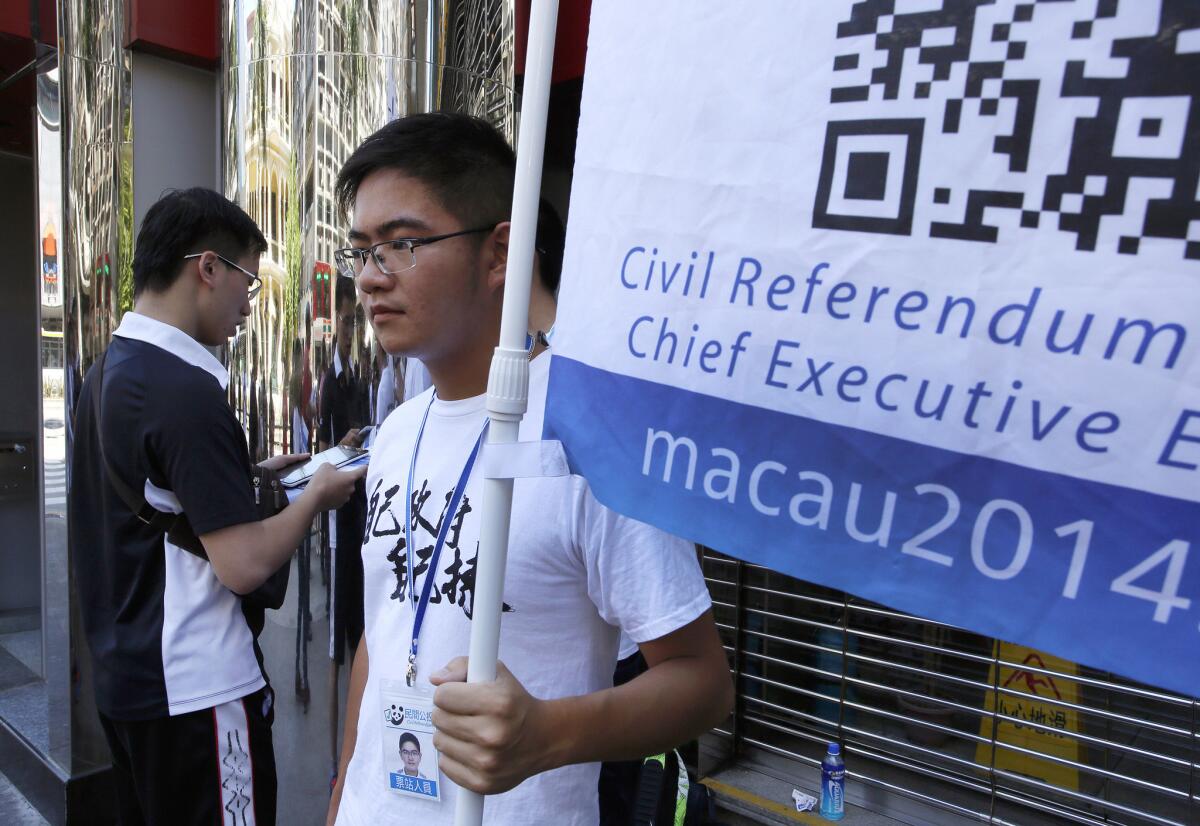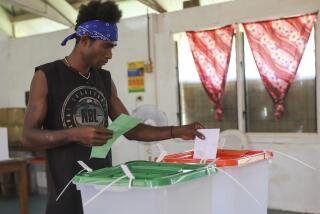Macao: Informal poll in Chinaâs casino mecca faces Beijingâs disfavor

Reporting from Beijing â Democracy activists in Chinaâs casino hot spot of Macao have challenged the house with an informal poll to size up support for political reforms. But police have intervened, arresting organizers of the nonbinding referendum.
The balloting, which took inspiration from a similar initiative this June in Hong Kong that drew nearly 800,000 votes, is asking locals to vote via the Internet on whether they have confidence in Chief Executive Fernando Chui Sai-on and whether the next person to hold the post should be directly elected in 2019.
Police on Sunday raided polling stations equipped with computer tablets at the start of the weeklong vote, closing all five booths within two hours, according to one of the referendum organizers, Jason Chao Teng-hei of the Open Macao Society. Even so, the referendum organizersâ goal of 5,000 votes was surpassed by noon Monday as balloting continued online. To vote, residents are required to use their Macao resident identity number as verification.
Macao is a former Portuguese territory that was returned to Chinese rule in 1999. Like neighboring Hong Kong, Macao is a semiautonomous region governed under the principle of âone country, two systems,â which allows general self-governance but limits elections to candidates vetted by committees of Beijing-friendly elites.
As the only place where casinos are legal in China, Macao has become the worldâs top gambling spot in recent years, with resorts operated by major Las Vegas gaming companies. Gambling revenue topped $45 billion in the city last year -- the vast majority from mainland visitors.
The Open Macao Society was one of three groups organizing the referendum. Chao said he was among five people taken into custody Sunday for charges related to the referendum; the others included Scott Chiang Meng-lin, a leader of the democratic group New Macao Assn. All were later released, Chao said.
The activists were arrested on charges of âaggravated disobedience,â accused of violating Macaoâs laws on privacy by collecting personal data without proper consent, according to Chao, who disputed the allegations.
âCitizens were fully informed [about] what we were going to do with the data,â he said in a phone interview Monday. âItâs clear the government is doing whatever it takes to suppress the initiative of the civil referendum.â
A 400-person committee is expected to reappoint Chui, the incumbent chief executive, for a second five-year term Sunday, the same day the referendum organizers plan to release the results of their unofficial poll.
Since Chui is the only candidate approved to run, his election is essentially guaranteed.
But locals complain about a range of issues including high housing prices, growing income inequality and limited resources in the city, which has a population of 600,000.
Restrictions on academic freedom are also a growing concern. In July, professor Eric Sautede was told he would be fired from the University of Saint Joseph because of his intervention in political debates. Another academic, Bill Chou Kwok-Ping, claimed that his social activism led to the loss of his post this month at the University of Macao.
In May, more than 20,000 people marched on the Macanese legislature to call on the chief executive to step down if he did not veto a bill granting extravagant retirement packages to top officials.
Responding to the unofficial vote taking place this week, Chui stated that the âdemandsâ of the civil referendum do not align with the current election methods stipulated by Macaoâs Basic Law, according to the Macao-based radio and television network Teledifusao de Macao.
The Global Times, a Beijing-based government news outlet with a strong nationalist bent, derided the poll as âa cheap version of the Hong Kong referendum, which is vulgarizing and entertaining the chief executive election.... Such interpretation of a simplified Macao election system is absurd.â
Silbert is a special correspondent.
More to Read
Sign up for Essential California
The most important California stories and recommendations in your inbox every morning.
You may occasionally receive promotional content from the Los Angeles Times.










